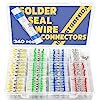Bassman
Lil-Rokslider
Question for all you electricians... What brand electrical connectors, terminals and heat shrink do you all recommend? All relatively small wire applications (10-22 AWG) for boat, truck and marine applications. I'd rather spend a little more per component rather than potentially have a bad connection that I have to diagnose. However, I have a hard time differentiating between various brands on Amazon and what is actually a "quality" component vs. mass produced junk. For what it's worth, I typically prefer using uninsulated connectors/terminals + dielectric grease + heat shrink. The Wirefy brand (link) caught my eye, seems to be a USA owned company and the description claims they are "thicker" connectors. Anyone have any experience with their wiring components or crimpers? The ratchet crimpers with interchangeable dies caught my eye.
Looking for recommendations (brand specific) on connectors, terminals and dual walled heat shrink from the experts. Any tips on how to differentiate and weed through the options would be much appreciated!
Looking for recommendations (brand specific) on connectors, terminals and dual walled heat shrink from the experts. Any tips on how to differentiate and weed through the options would be much appreciated!

